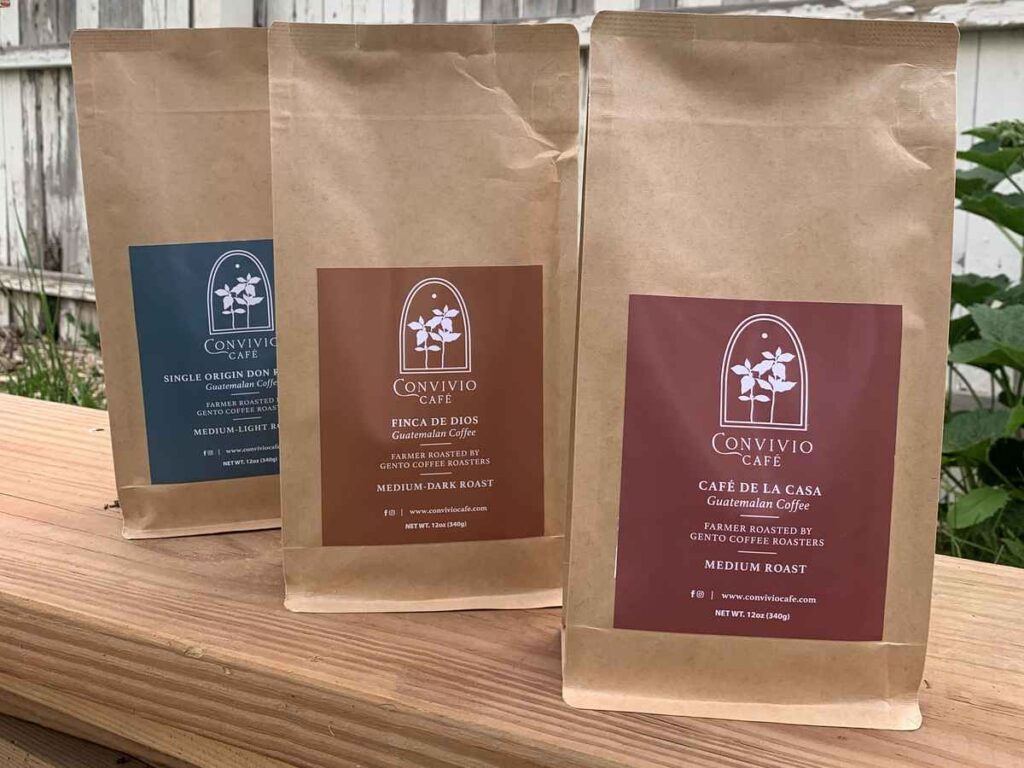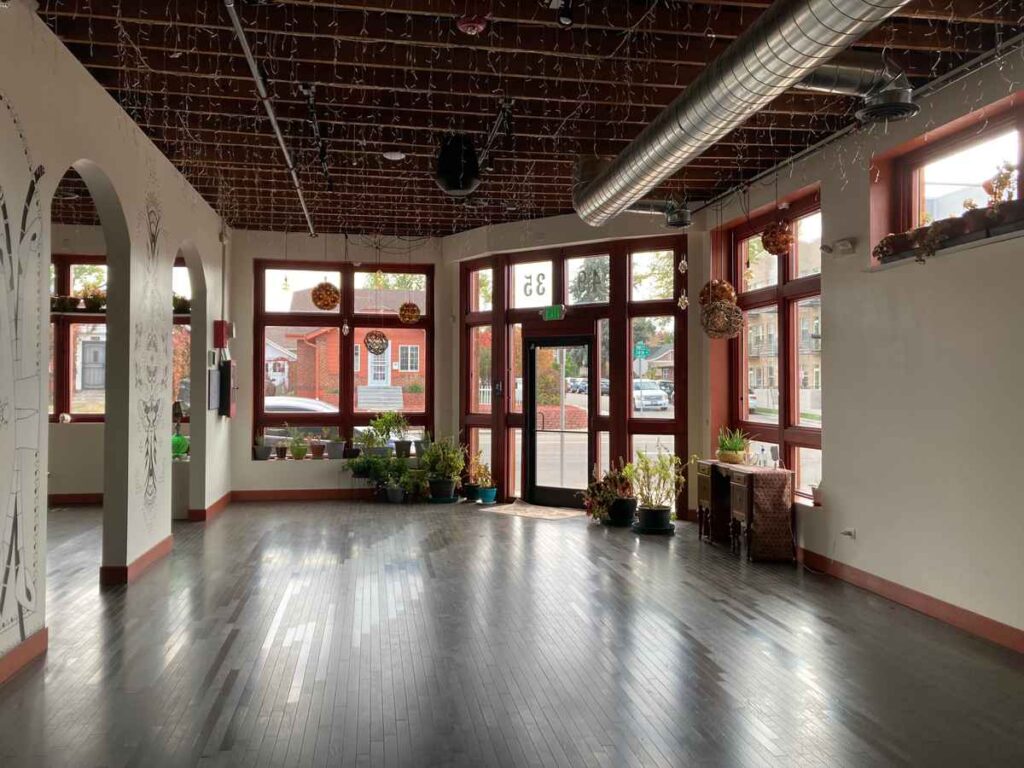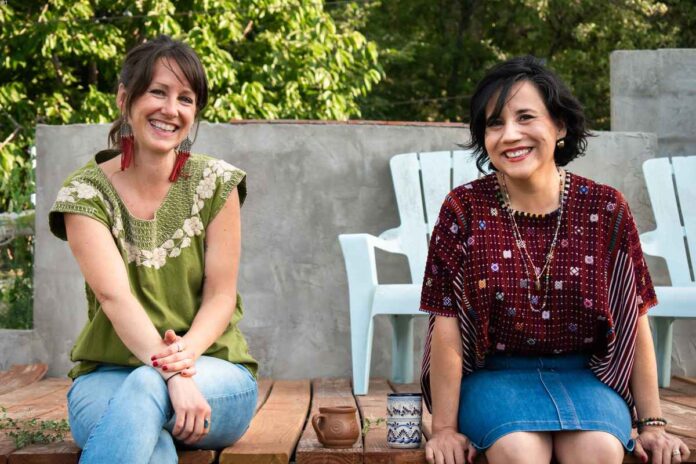Kristin Lacy and Vivi Lemus are in uncharted waters. The pair of first-time business owners are in the process of raising capital to open Convivio Café, which they describe as the first woman-owned, bilingual, Guatemalan coffee shop in Denver. They’re charging forward with unique coffee-sourcing and fundraising models.
The friends, who met in 2015 after Kristin returned from three years living and working in Vivi’s native Guatemala, built a friendship kick-started by a shared cup of coffee and love of Guatemalan culture. They both felt something was missing in Denver: a space that was equally accessible to Spanish and English speakers, that valued the conversation over a steaming mug of coffee as much as it valued its beans, and that was affordable to a everyone section of Denver’s population.
Convivio Café is the result. Lacy and Lemus hope to open in spring of 2022 inside of Enigma Bazaar, a bar and event space on the border of Denver’s West Highland and Berkeley neighborhoods. Convivio’s beans are farmer-roasted—a process that leaves more profits in the hands of coffee farmers—and a cup of joe will ring in at just $2. Coffee will be served with antojitos and baked goods (“Guatemalan-inspired snacks, like stuff you’d eat after school,” says Lemus). We were also intrigued by the company’s decision to raise capital on Mainvest, which reads as a cross between old-school crowdfunding and an IPO, where the public can invest small (or large!) amounts of money and will be paid back with earnings over time.

DiningOut: What inspired you to make the leap to open Convivio Café?
Kristin Lacy: [Vivi and I] met seven years ago, when I’d just returned from Guatemala. We fell in love over coffee and food and culture. I thought there weren’t a lot of spaces on the west side of Denver bringing together the diversity of our community. Last year we both lost parts of our jobs in the pandemic. Now, more than ever, we need these spaces.
Vivi Lemus: I am Guatemalan and I’ve lived in Denver for 20 years. There’s plenty of to-go coffee here, and there are beautiful places to visit, but the coffee culture in Guatemala is less about the product. It’s about meeting people and sitting there and talking to them. Fast forward to last year…it was just time.
DO: You say Convivio Café keeps four times more money with coffee farmers. How?
KL: Our model is a bit different: We serve farmer-roasted coffee. We try to keep as much of the supply chain in the country of origin as possible.
VL: Growing up, it was sad to see Guatemalans consuming the worst quality coffee and exporting the best quality. We saved good coffee only for special occasions and guests.
KL: Coffee farmers take all the risks. They put all the hard work, labor, and love into the soil. Coffee trees take five years to produce fruit and [the terroir] produces a lot of the taste, but then we ship it to consuming countries and pay 90 percent of profits to cafes and roasters there. Farmers are left with 10 percent of the profits.
If you visit some of these amazing regions and have coffee with the farmers, they serve Nescafé because they are exporting everything that’s of quality. They don’t know what’s happening with their own product. That’s such a power imbalance.
We’re trying to flip that model on its head. Our farmers in Guatemala and Nicaragua roast the coffee and cup it [test for quality] on the farm. The beans are rivaling the world’s highest-quality roasters—earning 85, 87 points—and shipping it to us within 24 hours.
DO: What’s been your experience with traditional methods of raising capital like bank and Small Business Administration (SBA) loans?
VL: As someone who hasn’t done this before, it’s been fascinating to see a huge gap in finding capital for someone who doesn’t already have a trust fund or a rich uncle. When you’ve been working and putting aside everything you make and you go the traditional route, you don’t have credibility and you don’t get a loan.
It’s been frustrating as a newcomer to this game. When you look at entrepreneurship, you have to have money to get more money. There are microloans, but do they know how much an espresso machine costs?
KL: Vivi said it really well. We’re seeing this gap where’s there’s some support for micro businesses, like, we’ll give you $3,000 if you finish this bootcamp. OK, $3,000 is going to get me half of an architect. Then there’s SBA loans which are a bit larger, but they’re like, Do you have $1 million to start up? Also, you won’t get paid for 3 years because you have a spouse with a job or a rich uncle. We have to keep our day jobs until the day we can start the business.
We did go some of the traditional routes. We have a loan through the Colorado Enterprise Fundand we are supplementing that with the Mainvest campaign.

DO: There are lots of different crowdfunding platforms. Why Mainvest?
VL: The model just makes sense. You pay back a percentage to the community, so there’s vested interested from the community members. If you succeed, they succeed.
KL: We didn’t want to just do traditional crowdfunding. We wanted to do an investment model instead of a donation. It’s a way to democratize investing. You can invest as little as $100 and we’re paying interest to our community instead of to a big bank.
Mainvest actually reached out to us after they read an article about us. They were incredibly excited and really helpful. We achieved our goal [of raising $60,000] so much faster than we expected. We were humble and a little scared when we opened this up, but people were buying in and buying in hard.
DO: What other organizations and people have been especially valuable to you as you go through this process?
VL: The nonprofit where we met (Re:Vision and Hecho en Westwood Collective) have been incredibly generous. It’s a really cool network and we’ve been very supported by other mini pop-ups there.
KL: We’ve had so many people help us with marketing. Our architects are neighbors of mine. We just met a coffeeshop going out of business and they’re selling us a bunch of equipment at a great rate. They want to see us succeed.
VL: Chef [Edwin Sandoval of Xatrucho] literally gave us a call and said here’s a concrete thing I can do to help—do you want to join us [at Enigma]?
DO: Your website says Covivio will be “fully bilingual.” I feel like there’s a story behind that.
VL: There all these gathering spots that are targeted to the Spanish-speaking community, but if you don’t speak English it can be hard to order. A lot of these places are primarily white spaces allowing other people to come in. I hear from people, I finally got the courage to step into this space and figure out what to order and how to pronounce it. Then I came back and I forgot what it was.
So if you are a Spanish speaker you don’t have to think twice. We’ll have bilingual baristas and words in Spanish and English. People don’t have to wonder how to say things.
Talk to us! Email your experiences (and thoughts, opinions, and questions—anything, really) to askus@diningout.com.

